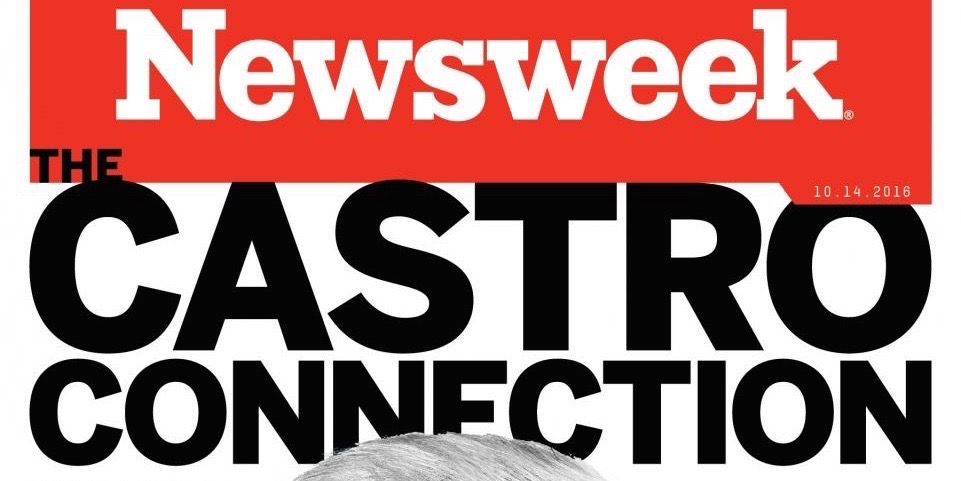
Newsweek: Miami Herald deceives readers on Trump’s Cuba dealings
That the Miami Herald and for that matter El Nuevo Herald deceive their readers is old news, as far as we’re concerned. We’ve been pointing that out since Progreso Weekly first started publishing its now defunct column, B.S. Detector. It turns out, though, that news organizations around the country are now catching on to this fact. In an article published Saturday (Oct. 1) by Kurt Eichenwald in Newsweek, the headline reads: “Miami Herald deceives readers on Trump’s 1998 Cuba dealings.”
Eichenwald begins by explaining that after posting the article he called Miami Herald Metro editor Jay Ducasi. Here’s how Eichenwald explains it:
After this article was posted, Jay Ducassi, the metro editor of the Miami Herald, received a message left earlier by Newsweek. Ducassi said, “The Miami Herald often attaches related archived stories to news articles. The day after a front-page article was published about the Newsweek report, the 1999 opinion piece by Donald Trump from our archives was linked to the online version of our coverage. We should have noted that the Trump op-ed was being reprinted solely in the context of the current controversy surrounding his purported 1998 violation of the Cuban embargo.”
Then the first two paragraphs of the story:
The competition for worst journalistic decision has been intense during the 2016 election season. But the winner—at least up to now—is no doubt the Miami Herald. It made a choice that horribly deceived their readers about reality—and the incompetence it took to make such a huge error is almost incomprehensible.
This, again, starts with the 1998 decision by one of Donald Trump’s companies to violate federal law by breaking the Cuban embargo during the presidency of Fidel Castro. At the time, there were calls in Washington to loosen or even drop the decades-long trade restrictions, and in an effort to lay the groundwork for new business if the embargo dropped, Trump Hotels & Casino Resorts sent some consultants to Havana. There, these representatives from the consulting firm, Seven Arrows Investment and Development Corp., met with officials from the Castro government, financiers and business people. All told, the effort cost $68,000, much of which was spent illegally traveling to and working in Cuba.

As most know by now, on Sept. 29, Newsweek, and specifically Eichenwald, had broken the news that a Trump company had violated the U.S. embargo against Cuba. In that first article Eichenwald wrote that “documents show that the Trump company spent a minimum of $68,000 for its 1998 foray into Cuba at a time when the corporate expenditure of even a penny in the Caribbean country was prohibited without U.S. government approval.”
This was important news, especially here in Miami, considering that Donald Trump counts heavily on Cuban Miami republicans in his bid for the presidency. The problem, though, is that those same Cuban Miami republicans expect Trump to come down hard on the Cuban government. In a recent visit to South Florida, in fact, Trump stated to a crowd of voters that he “condemned President Barack Obama’s normalization of relations between the two countries, calling it a ‘one-sided deal for Cuba and with Cuba, benefits only the Castro regime.’”
Obama’s rapprochement with Cuba, he added during his visit here, was done by executive order, which he promised to reverse unless Cuba makes concessions on religious and political freedoms and releases political prisoners.
Days after his visit to Miami Eichenwald published his expose of Trump’s foray into Cuba, which left many in the Cuban exile community wondering what to think of the Republican presidential nominee. Sen. Marco Rubio, now a Trump supporter, called the Newsweek report “troubling.”
In what appears to be an attempt at softening the news of Trump’s Cuba foray in 1998, the Herald immediately re-printed a published op-ed piece written for the Miami Herald on June 25, 1999, (without disclaimers) where Trump “proclaimed his steadfast support for the embargo he had just broken.”
Here’s how Eichenwald explains it:
This week, the Miami Herald decided to reprint the dishonest 1999 Trump opinion piece, with no explanation that the newspaper had been tricked into letting a politician-in-waiting deceive their readers about how this man did business. The invoice, which Newsweek has made available to anyone who asks, was not printed. No indication was made that the evidence is incontrovertible that Trump’s secret actions contradicted his public comments.
Newsweek telephoned the Miami Herald news desk and was assured an editor would call back to discuss their decision to reprint the op-ed piece without including the evidence of Trump’s deceit. No one returned the call.
Eichenwald then finishes his latest article in Newsweek regarding the Herald’s lack of professionalism by writing:
The bottom line: American voters are preparing to decide who will be the President of the United States. This is serious stuff. The media has spent enough time with nonsense like Dr. Oz’s opinion of Trump’s health. Throwing a known falsehood back into the public—and pretending it reflects even a modicum of reality—constitutes journalistic malpractice. Miami Herald: Shame on you.
[If you are interested in reading both Newsweek stories in their entirety, click here for the Sept. 29 report, and here for the Oct. 1 article.]


